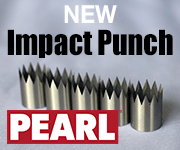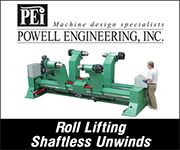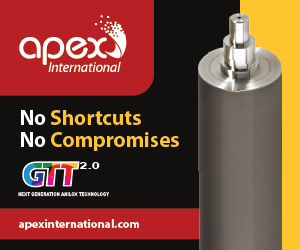Knowing Your Limitations Can Accentuate Your Strengths
- Published: August 01, 2002, By David J. Bentley Jr., RBS Technologies
A baby can place a big toe into his or her mouth. Adults usually cannot accomplish this feat. Mathematicians can solve differential equations. Many accomplished stage actors cannot perform such calculations. Everyone has limitations of one sort or another, and converters are no exception. These limitations most frequently relate to their converting equipment.
A specific converter may manufacture an extensive line of tapes with pressure-sensitive adhesives (PSAs) that have a range of properties. The variety of adhesives allows the converter to provide tapes that have various degrees of tack, adhesive strength, cohesive strength, and other properties. The converter may learn of a tape made by a competitor that adheres to plastic bags in temperatures encountered by frozen foods. The converter does not have this type of tape in his line and would like to add it.
The usual procedure would be to evaluate various adhesives that might offer very low-temperature adhesion to plastic bags. When the converter in this example performs such an evaluation, he cannot find a suitable adhesive after testing many candidates.
Why is he not successful? The converter uses a roll coater to apply aqueous PSA products to fabricate his tapes. The only adhesive that has the necessary balance of characteristics for the freezer application is a hot melt PSA. Since application of a hot melt adhesive using a coater designed for aqueous products is impossible, the converter has a limitation. His coating equipment simply does not allow him to manufacture the desired tape.
Consider another example. A supplier of coatings develops a new product that provides excellent resistance to heat and chemicals. Performance of the new coating is excellent based on pilot trials. He samples the material to various converters for evaluation. Some customers confirm the results obtained by the supplier and immediately begin to order large quantities for their use. After running test quantities, other customers report the new coating does not have the high degree of heat and chemical resistance claimed by the supplier. Why can some converters use the product to obtain successful results and others cannot?
In this case, the reasons for the different performance levels by different converters are related to limitations caused by coating equipment differences. To achieve the excellent heat and chemical resistance touted by the supplier, the coating must experience a certain level of heat during the coating operation.
This can occur by exposing the coating to a high temperature for a short time during processing or to a moderate temperature for a long time. Those converters who failed to see the expected performance were unable to expose the coating to the required degree of heating. Some converters had ovens that could not achieve sufficient high temperatures or were too short for use of more moderate temperatures.
Converters reading this column probably recall similar situations they experienced relating to limitations imposed by their converting equipment. All converters need to know their limitations. They cannot be all things to all people by providing every possible type of product. Do what you can do well and relegate the remainder to others. Know the limitations of your converting equipment before committing to provide a certain type of product. Otherwise you may risk putting your foot in your mouth.
David J. Bentley Jr. is a recognized industry expert in polymers, laminations, and coatings with more than 30 years of experience in R&D and technical service. Contact him at dbentley@unm.edu.












